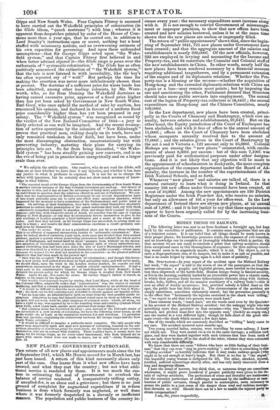HIDDEN THINGS ON RAILWAYS.
[The following letter was sent to us from Scotland a fortnight ago, but kept back by the casualties of publication. It contains some suggestions that are not i of a transient nature. It is our belief that all things should be made known in their proper places; for knowledge promotes truth, the exposure of evil remedies, and no knowledge can be complete or thoroughly wholesome which is partial. On that account we are not ready to conclude a priori that railway accidents should form exceptional cases in this thoroughness of exposure; for then railway-travel- ling would seem to be singularly unsafe; which it is not. The object is, not to raise a disproportionate idea of its dangers, but to make it as safe as possible, and that is no doubt helped by throwing upon it a full share of publicity.] SrEcrAron—In your report of the accident upon the Midland Railway last week, " the sequel" is told in the words of one of the passengers on that dis-
astrous excursion: a graphic and frightful picture, more terrible to the imagina-
tion than shipwreck or the battle-field. Human beings dozing. in fancied security, at five in the morning, suddenly hurled by an irresistible power into a chaotic mass,
in which their precious limbs become indiscriminate elements along with timbers,
breaks, bolts, buffers, and all the massive machinery of a railway train!—this is now an affair of weekly occurrence•' but, provided nobody is killed dead on the spot, the public hear but little about it. The circumstances of the accident are simply sometimes, sometimes elaborately stated; but the peroration generally is to the effect that "fortunately the injuries sustained in the shock were trifling," or, " we regret to add that two persons were much hurt." These innocent words, "much hurt," are the words used even by the Spectator in his account of the Midland Railway accident: but the unhappy wight who was something more than spectator on that occasion—who was "thrown furiously forward, and pitched head-first into the opposite seat," (luckily an empty one, sets the matter in a very different light; though he falls short of the great ulti- mate event—the death which ensued a few days. later.
One of the results which are commonly described as "trifling" lately came to my ears. The accident occurred some months ago.
Two young married ladies, cousins, were travelling by some railway, I know not which one. They were seated vis-à-vis in the same carriage; a collision took
place, and they were dashed together with such violence that tour front teeth of the one lady were broken oft' in the skull of the other, whence they were extracted with very considerable difficulty. We know that there are some "fellows who have so little feeling of their busi- ness" that they can even " sing in grave-making "; and there is something in this "trifling accident" so horribly ludicrous that it may make railway-people (who ought to be sad enough at heart) laugh. But there is no fun in the sequel." One beautiful young woman is disfigured for life. The other, shocked, injured, terrified, suffered miscarriage shortly after, and has only lately recovered from a long and dangerous illness. 1 hate the detail of horrors, but think that, as nauseous drugs are sometimes wholesome, it might prove beneficial if greater publicity were given to the de- tails of railway accidents. The particulars of crime and brutality are loathsome; but the minutest particulars of sufferings occasioned by the inefficiency or care. lessness of public servants, though painful to contemplate, seem necessary to arouse the public to a just sense of the danger these mad and reckless monopo- lists threaten us with. Should there not be a law to enable the injured party to obtain compensation?


























 Previous page
Previous page